AP Euro AP Classroom Questions Unit 7
1/23
Earn XP
Name | Mastery | Learn | Test | Matching | Spaced |
|---|
No study sessions yet.
24 Terms
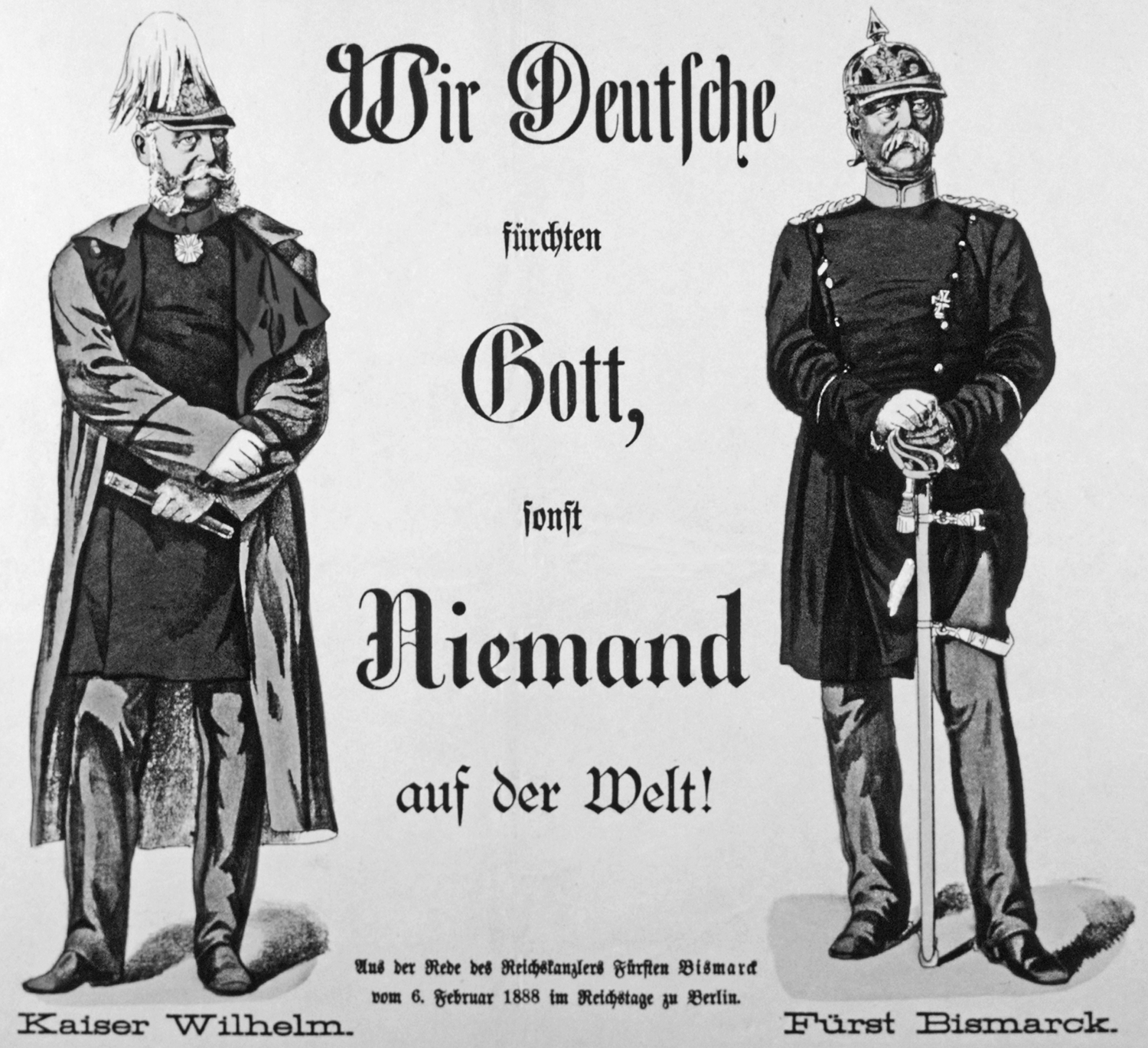
The message of the poster is best explained in the context of the
successful unification of Germany under Prussian leadership
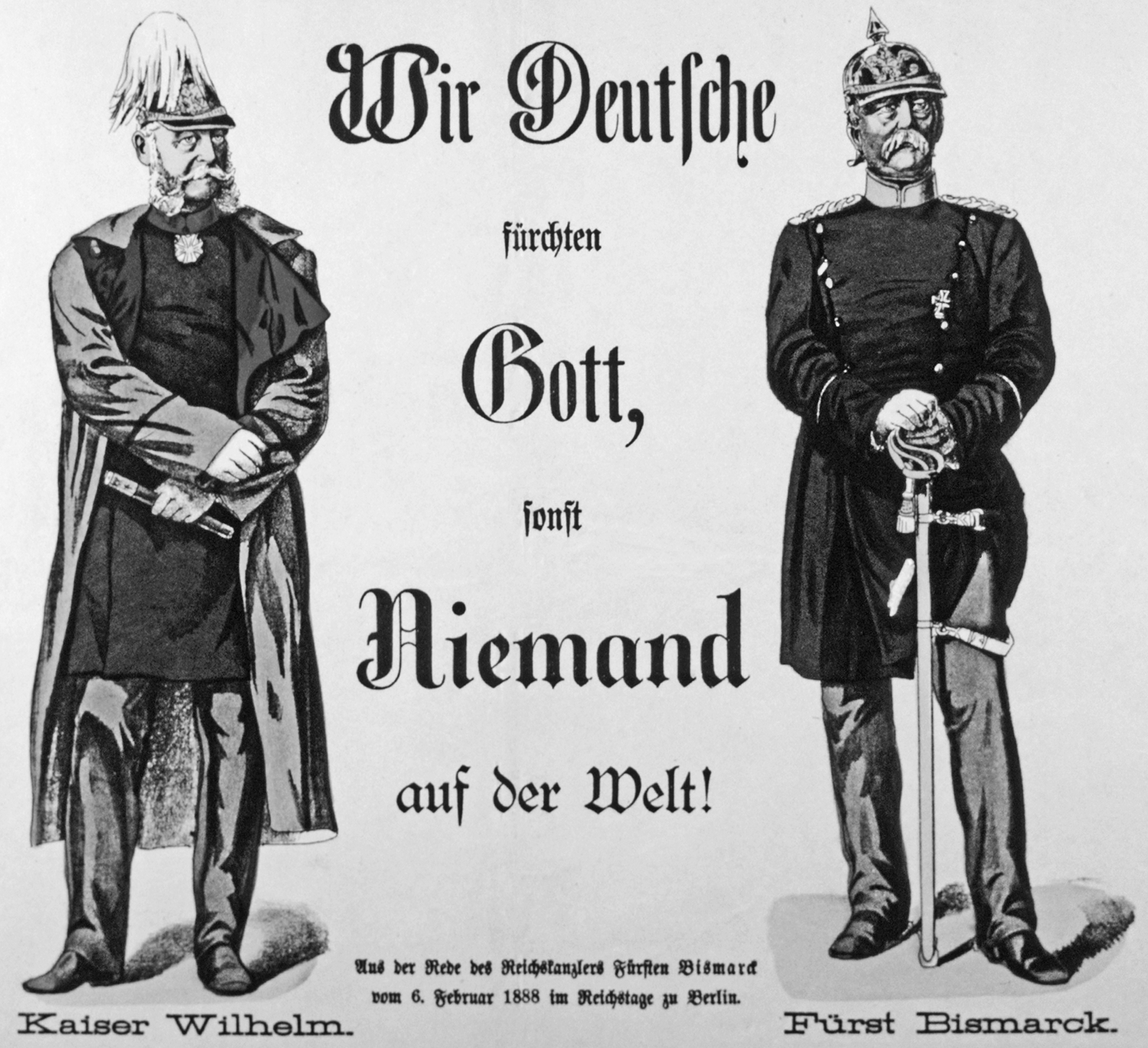
The prominence of Bismarck in the poster is best explained by his
key role in establishing a new European diplomatic order after the breakdown of the Concert of Europe
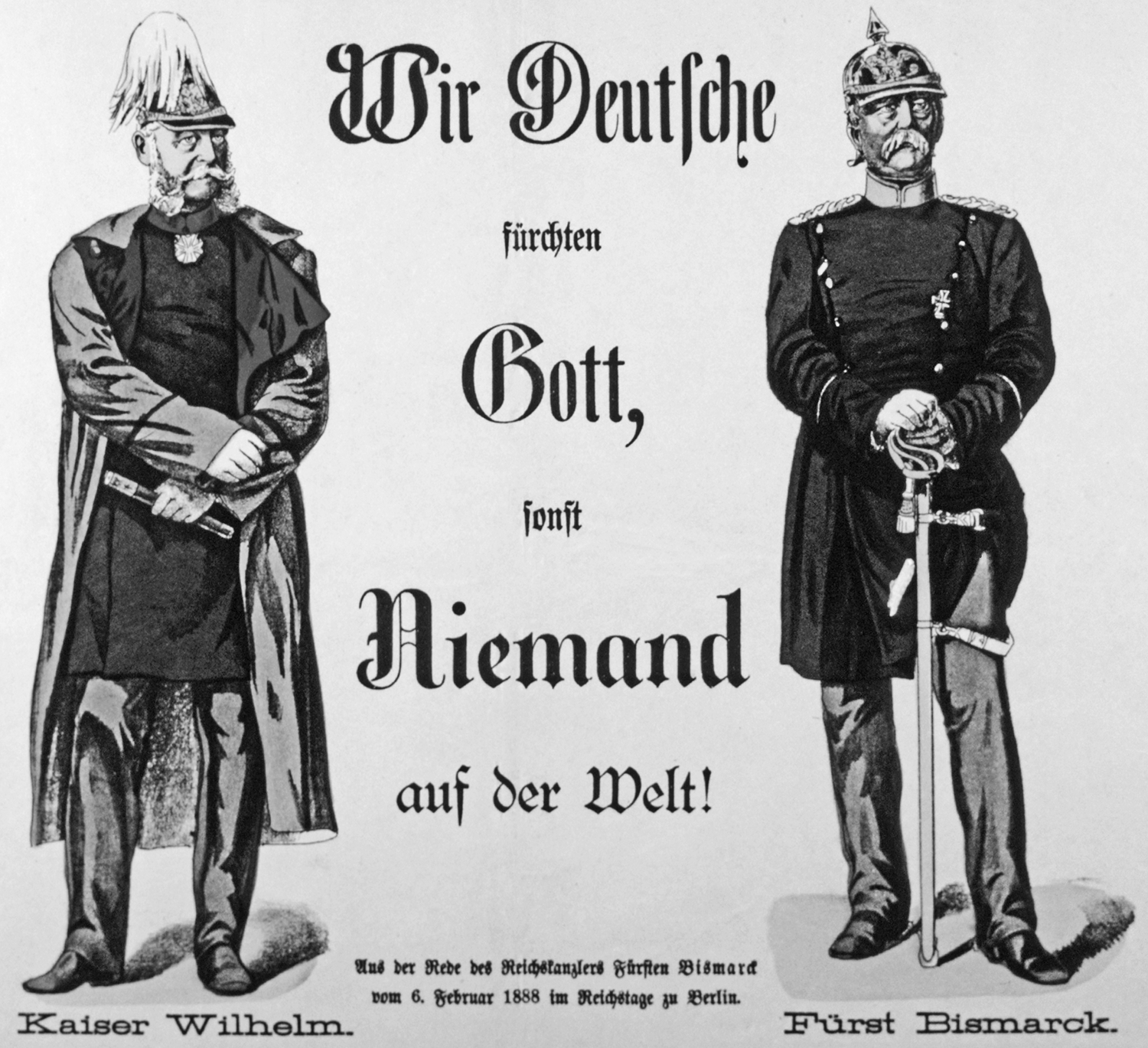
The way the kaiser and Bismarck are portrayed is best explained by the
increasing political and diplomatic tensions in Europe in the late nineteenth century
“To my surprise, His Majesty [Kaiser Wilhelm II] received me with great friendliness, listened positively to my explanation, and then indulged himself in a highly detailed lecture on the navy. . . . He enumerated the ships we have and the ones we would need in order to survive a war; . . . emphasized that we had to have an armored fleet to protect our trade and to keep ourselves supplied with provisions; and was of the opinion that our fleet would have to be strong enough to prevent the French fleet from cutting off the food supplies we needed. In addition, he . . . would have to find the means, and if the Reichstag did not approve this, he would nevertheless carry on building and present the Reichstag with the bill later. Public opinion didn’t concern him. He knew that the people didn’t love him, and cursed him; but that wouldn’t deter him. I then reminded the Emperor of the difference between Prussia and the [German] Empire . . . In the Empire the Emperor only had the rights which the Reichstag conceded to him.”
Account of a conversation between German chancellor Hohenlohe-Schillingsfürst and Kaiser Wilhelm II in 1897, published in the chancellor’s memoirs, 1931
Which of the following best explains a significant difference between Bismarck's methods of governance and the kaiser’s, as described in the passage?
Bismarck, who had engineered the unification of various states into the German Empire, followed a populist approach.
“I do protest against the language which we have heard from Mr. Layard, the honorable member of Parliament from Aylesbury . . . who says we have disgraced our country, tells us we ought to be the laughingstock of Europe, and has thought proper to mingle his observations and recommendations with what I must call vulgar declamations against the aristocracy of this country.
When I look at the matchless bravery of the troops, and when I look to the share which the gentry and aristocracy of the country have taken in those conflicts, I say that I feel proud. Why, look to that glorious charge of the cavalry at Balaklava [a battle in the Crimean War], site of the charge of the Light Brigade, where the noblest and the wealthiest of the land rode foremost, followed by heroic men from the lowest classes of the community, each rivaling the other in bravery, neither the peer who led nor the trooper who followed being distinguished the one from the other. . . . I would appeal to that gallant charge as an immortal proof of the glory of this country.”
Lord Palmerston, British home secretary, speech in Parliament on the conduct of the Crimean War, 1855
Which of the following historical circumstances best explains why Palmerston chose to describe the charge of the Light Brigade in the way that he did?
The British political system was gradually affording more representation and political power to members of the lower classes.
“I do protest against the language which we have heard from Mr. Layard, the honorable member of Parliament from Aylesbury . . . who says we have disgraced our country, tells us we ought to be the laughingstock of Europe, and has thought proper to mingle his observations and recommendations with what I must call vulgar declamations against the aristocracy of this country.
When I look at the matchless bravery of the troops, and when I look to the share which the gentry and aristocracy of the country have taken in those conflicts, I say that I feel proud. Why, look to that glorious charge of the cavalry at Balaklava [a battle in the Crimean War], site of the charge of the Light Brigade, where the noblest and the wealthiest of the land rode foremost, followed by heroic men from the lowest classes of the community, each rivaling the other in bravery, neither the peer who led nor the trooper who followed being distinguished the one from the other. . . . I would appeal to that gallant charge as an immortal proof of the glory of this country.”
Lord Palmerston, British home secretary, speech in Parliament on the conduct of the Crimean War, 1855
Which of the following accurately explains a similarity between Palmerston’s use of nationalism in his portrayal of the charge of the Light Brigade and the use of nationalism by Camillo Cavour and Otto von Bismarck?
Like Bismarck and Cavour, Palmerston was a conservative using militaristic nationalism to strengthen the state and his political position.
“To my surprise, His Majesty [Kaiser Wilhelm II] received me with great friendliness, listened positively to my explanation, and then indulged himself in a highly detailed lecture on the navy. . . . He enumerated the ships we have and the ones we would need in order to survive a war; . . . emphasized that we had to have an armored fleet to protect our trade and to keep ourselves supplied with provisions; and was of the opinion that our fleet would have to be strong enough to prevent the French fleet from cutting off the food supplies we needed. In addition, he . . . would have to find the means, and if the Reichstag did not approve this, he would nevertheless carry on building and present the Reichstag with the bill later. Public opinion didn’t concern him. He knew that the people didn’t love him, and cursed him; but that wouldn’t deter him. I then reminded the Emperor of the difference between Prussia and the [German] Empire . . . In the Empire the Emperor only had the rights which the Reichstag conceded to him.”
Account of a conversation between German chancellor Hohenlohe-Schillingsfürst and Kaiser Wilhelm II in 1897, published in the chancellor’s memoirs, 1931
Which of the following best explains the historical significance of the view of the importance of the navy expressed by the kaiser in the passage?
It demonstrates the thinking behind the arms race that contributed to diplomatic tensions between Germany and Great Britain.
“To my surprise, His Majesty [Kaiser Wilhelm II] received me with great friendliness, listened positively to my explanation, and then indulged himself in a highly detailed lecture on the navy. . . . He enumerated the ships we have and the ones we would need in order to survive a war; . . . emphasized that we had to have an armored fleet to protect our trade and to keep ourselves supplied with provisions; and was of the opinion that our fleet would have to be strong enough to prevent the French fleet from cutting off the food supplies we needed. In addition, he . . . would have to find the means, and if the Reichstag did not approve this, he would nevertheless carry on building and present the Reichstag with the bill later. Public opinion didn’t concern him. He knew that the people didn’t love him, and cursed him; but that wouldn’t deter him. I then reminded the Emperor of the difference between Prussia and the [German] Empire . . . In the Empire the Emperor only had the rights which the Reichstag conceded to him.”
Account of a conversation between German chancellor Hohenlohe-Schillingsfürst and Kaiser Wilhelm II in 1897, published in the chancellor’s memoirs, 1931
Which of the following best explains the significance of the kaiser’s dispute with the Reichstag as expressed in the passage?
Bismarck had used the rhetoric and forms of democracy to unify Germany despite his own autocratic tendencies, leading to the influence of mass politics on German policies.
“I do protest against the language which we have heard from Mr. Layard, the honorable member of Parliament from Aylesbury . . . who says we have disgraced our country, tells us we ought to be the laughingstock of Europe, and has thought proper to mingle his observations and recommendations with what I must call vulgar declamations against the aristocracy of this country.
When I look at the matchless bravery of the troops, and when I look to the share which the gentry and aristocracy of the country have taken in those conflicts, I say that I feel proud. Why, look to that glorious charge of the cavalry at Balaklava [a battle in the Crimean War], site of the charge of the Light Brigade, where the noblest and the wealthiest of the land rode foremost, followed by heroic men from the lowest classes of the community, each rivaling the other in bravery, neither the peer who led nor the trooper who followed being distinguished the one from the other. . . . I would appeal to that gallant charge as an immortal proof of the glory of this country.”
Lord Palmerston, British home secretary, speech in Parliament on the conduct of the Crimean War, 1855
Which of the following best explains why Palmerston was anxious to deny the “vulgar declamations” that he claims were made by Layard?
The majority of the military and civilian leaders of the British war effort were members of the aristocracy.
The prevalence of the philosophy of positivism in much of European society in the latter half of the nineteenth century was most closely connected to which of the following?
Broad technological progress that was improving the lives of many Europeans
Historians have connected the growing lack of confidence in an objective view of nature seen among many late-nineteenth and early-twentieth-century intellectuals most directly to which of the following?
Advances in theoretical physics such as relativity theory and quantum physics
Sigmund Freud’s view of human psychology and motivation most directly contradicts the view of human nature associated with which of the following periods?
The Enlightenment
“The great break in the organic chain between man and his nearest allies, which cannot be bridged over by any extinct or living species, has often been advanced as a grave objection to the belief that man is descended from some lower form; but this objection will not appear of much weight to those who, from general reasons, believe in the general principle of evolution. Breaks often occur in all parts of the series, some being wide, sharp and defined, others less so in various degrees. . . . In some future period, not very distant as measured by centuries, the civilized races of man will almost certainly exterminate and replace the savage races throughout the world. . . .
We have seen in the last two chapters that man bears in his bodily structure clear traces of his descent from some lower form; but it may be urged that, as man differs so greatly in his mental power from all other animals, there must be some error in this conclusion. No doubt the difference in this respect [human mental powers] is enormous even if we compare the mind of one of the lowest savages, who has no words to express any number higher than four, and who uses hardly any abstract terms for common objects, or for the affections, with [the mental powers] of the most highly organized ape. The difference would, no doubt, still remain immense, even if one of the higher apes had been improved or civilized as much as a dog has been in comparison with its parent-form, the wolf or jackal. The [native inhabitants of Tierra del Fuego] rank amongst the lowest [in terms of civilization]; but I was continually struck with surprise how closely the three natives on board H.M.S. Beagle,* who had lived some years in England, and could talk a little English, resembled us in disposition and in most of our mental faculties.”
*the ship on which Darwin traveled for his research expedition
Charles Darwin, The Descent of Man, 1871
Which of the following best explains the historical significance of Darwin’s argument in the passage?
It made an explicit claim that evolutionary development applied to human beings.
“The great break in the organic chain between man and his nearest allies, which cannot be bridged over by any extinct or living species, has often been advanced as a grave objection to the belief that man is descended from some lower form; but this objection will not appear of much weight to those who, from general reasons, believe in the general principle of evolution. Breaks often occur in all parts of the series, some being wide, sharp and defined, others less so in various degrees. . . . In some future period, not very distant as measured by centuries, the civilized races of man will almost certainly exterminate and replace the savage races throughout the world. . . .
We have seen in the last two chapters that man bears in his bodily structure clear traces of his descent from some lower form; but it may be urged that, as man differs so greatly in his mental power from all other animals, there must be some error in this conclusion. No doubt the difference in this respect [human mental powers] is enormous even if we compare the mind of one of the lowest savages, who has no words to express any number higher than four, and who uses hardly any abstract terms for common objects, or for the affections, with [the mental powers] of the most highly organized ape. The difference would, no doubt, still remain immense, even if one of the higher apes had been improved or civilized as much as a dog has been in comparison with its parent-form, the wolf or jackal. The [native inhabitants of Tierra del Fuego] rank amongst the lowest [in terms of civilization]; but I was continually struck with surprise how closely the three natives on board H.M.S. Beagle,* who had lived some years in England, and could talk a little English, resembled us in disposition and in most of our mental faculties.”
*the ship on which Darwin traveled for his research expedition
Charles Darwin, The Descent of Man, 1871
Darwin's perspective in the first paragraph regarding future developments is significant because of its
adaptation by racial thinkers, who used it to justify European imperialist policies
“The great break in the organic chain between man and his nearest allies, which cannot be bridged over by any extinct or living species, has often been advanced as a grave objection to the belief that man is descended from some lower form; but this objection will not appear of much weight to those who, from general reasons, believe in the general principle of evolution. Breaks often occur in all parts of the series, some being wide, sharp and defined, others less so in various degrees. . . . In some future period, not very distant as measured by centuries, the civilized races of man will almost certainly exterminate and replace the savage races throughout the world. . . .
We have seen in the last two chapters that man bears in his bodily structure clear traces of his descent from some lower form; but it may be urged that, as man differs so greatly in his mental power from all other animals, there must be some error in this conclusion. No doubt the difference in this respect [human mental powers] is enormous even if we compare the mind of one of the lowest savages, who has no words to express any number higher than four, and who uses hardly any abstract terms for common objects, or for the affections, with [the mental powers] of the most highly organized ape. The difference would, no doubt, still remain immense, even if one of the higher apes had been improved or civilized as much as a dog has been in comparison with its parent-form, the wolf or jackal. The [native inhabitants of Tierra del Fuego] rank amongst the lowest [in terms of civilization]; but I was continually struck with surprise how closely the three natives on board H.M.S. Beagle,* who had lived some years in England, and could talk a little English, resembled us in disposition and in most of our mental faculties.”
*the ship on which Darwin traveled for his research expedition
Charles Darwin, The Descent of Man, 1871
Darwin’s views of what he termed “savages” are best explained by which of the following?
Responses
The conceptions of European cultural and racial superiority common at the time
Source 1
“In the eighteenth century the British Empire had been, at best, amoral. The [British] had grabbed power in Asia, land in America and slaves in Africa. Native peoples were either taxed, robbed, or wiped out. But paradoxically their cultures were largely tolerated; in some cases even studied and admired.
The Victorians had more elevated aspirations. They dreamt not just of ruling the world, but of redeeming it. It was no longer enough for them to exploit other races; now the aim became to improve them. Native peoples themselves would cease to be exploited, but their cultures—[regarded by the Victorians as] superstitious, backward, heathen—would have to go. In particular, the Victorians aspired to bring light to what they called the Dark Continent [Africa].”
Niall Ferguson, historian, Empire: The Rise and Demise of the British World Order and the Lessons for Global Power, 2002
Source 2
“In the hundred years after [the 1757 battle of] Plassey, the East India Company, with an army of 260,000 men at the start of the nineteenth century and the backing of the British government and Parliament (many of whose members were shareholders in the enterprise), extended its control over most of India. The Company conquered and absorbed a number of hitherto independent or autonomous states, imposed executive authority through a series of high-born governors-general appointed from London, regulated the country’s trade, collected taxes and imposed its fiat on most aspects of Indian life. . . . But as the Company’s principal motive was economic, so too were the major consequences of its rule, both for India and for Britain itself.
Britain’s Industrial Revolution was built on the destruction of India’s thriving manufacturing industries. Textiles were an emblematic case in point: the British systematically set about destroying India’s textile manufacturing and exports, substituting Indian textiles by British ones manufactured in England. Ironically, the British used Indian raw material and exported the finished products back to India and the rest of the world, the industrial equivalent of adding insult to injury.”
Shashi Tharoor, political leader, Inglorious Empire: What the British Did to India, 2016
The British actions described in the passages best explain which of the following reactions in the late nineteenth century?
British colonial subjects who received a western education created nationalistic movements to resist imperialism.
Source 1
“In the eighteenth century the British Empire had been, at best, amoral. The [British] had grabbed power in Asia, land in America and slaves in Africa. Native peoples were either taxed, robbed, or wiped out. But paradoxically their cultures were largely tolerated; in some cases even studied and admired.
The Victorians had more elevated aspirations. They dreamt not just of ruling the world, but of redeeming it. It was no longer enough for them to exploit other races; now the aim became to improve them. Native peoples themselves would cease to be exploited, but their cultures—[regarded by the Victorians as] superstitious, backward, heathen—would have to go. In particular, the Victorians aspired to bring light to what they called the Dark Continent [Africa].”
Niall Ferguson, historian, Empire: The Rise and Demise of the British World Order and the Lessons for Global Power, 2002
Source 2
“In the hundred years after [the 1757 battle of] Plassey, the East India Company, with an army of 260,000 men at the start of the nineteenth century and the backing of the British government and Parliament (many of whose members were shareholders in the enterprise), extended its control over most of India. The Company conquered and absorbed a number of hitherto independent or autonomous states, imposed executive authority through a series of high-born governors-general appointed from London, regulated the country’s trade, collected taxes and imposed its fiat on most aspects of Indian life. . . . But as the Company’s principal motive was economic, so too were the major consequences of its rule, both for India and for Britain itself.
Britain’s Industrial Revolution was built on the destruction of India’s thriving manufacturing industries. Textiles were an emblematic case in point: the British systematically set about destroying India’s textile manufacturing and exports, substituting Indian textiles by British ones manufactured in England. Ironically, the British used Indian raw material and exported the finished products back to India and the rest of the world, the industrial equivalent of adding insult to injury.”
Shashi Tharoor, political leader, Inglorious Empire: What the British Did to India, 2016
The policies described in the second paragraph of Source 2 are most closely related to which of the following economic systems?
Responses
Mercantilism, which sought to maximize the home country’s positive balance of trade
Source 1
“In the eighteenth century the British Empire had been, at best, amoral. The [British] had grabbed power in Asia, land in America and slaves in Africa. Native peoples were either taxed, robbed, or wiped out. But paradoxically their cultures were largely tolerated; in some cases even studied and admired.
The Victorians had more elevated aspirations. They dreamt not just of ruling the world, but of redeeming it. It was no longer enough for them to exploit other races; now the aim became to improve them. Native peoples themselves would cease to be exploited, but their cultures—[regarded by the Victorians as] superstitious, backward, heathen—would have to go. In particular, the Victorians aspired to bring light to what they called the Dark Continent [Africa].”
Niall Ferguson, historian, Empire: The Rise and Demise of the British World Order and the Lessons for Global Power, 2002
Source 2
“In the hundred years after [the 1757 battle of] Plassey, the East India Company, with an army of 260,000 men at the start of the nineteenth century and the backing of the British government and Parliament (many of whose members were shareholders in the enterprise), extended its control over most of India. The Company conquered and absorbed a number of hitherto independent or autonomous states, imposed executive authority through a series of high-born governors-general appointed from London, regulated the country’s trade, collected taxes and imposed its fiat on most aspects of Indian life. . . . But as the Company’s principal motive was economic, so too were the major consequences of its rule, both for India and for Britain itself.
Britain’s Industrial Revolution was built on the destruction of India’s thriving manufacturing industries. Textiles were an emblematic case in point: the British systematically set about destroying India’s textile manufacturing and exports, substituting Indian textiles by British ones manufactured in England. Ironically, the British used Indian raw material and exported the finished products back to India and the rest of the world, the industrial equivalent of adding insult to injury.”
Shashi Tharoor, political leader, Inglorious Empire: What the British Did to India, 2016
The growth of domestic social reform movements in Britain
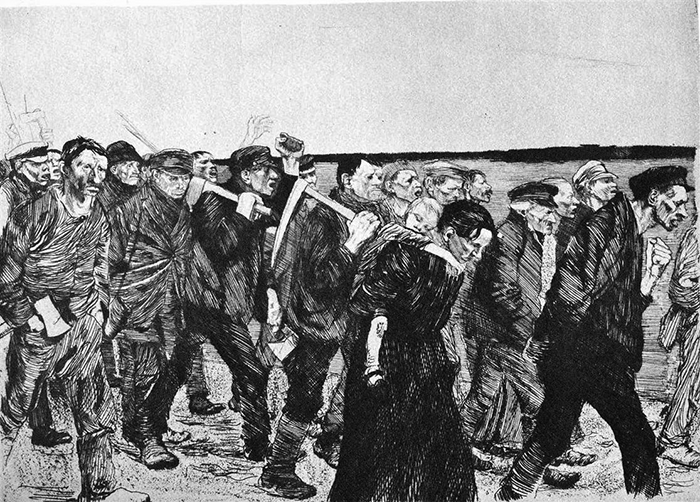
Kollwitz produced this engraving after watching a play about a famous strike by German weavers in the 1840s
Kollwitz’ portrayal of the weavers is best explained as an attempt to
sympathetically depict ordinary people affected by social problems
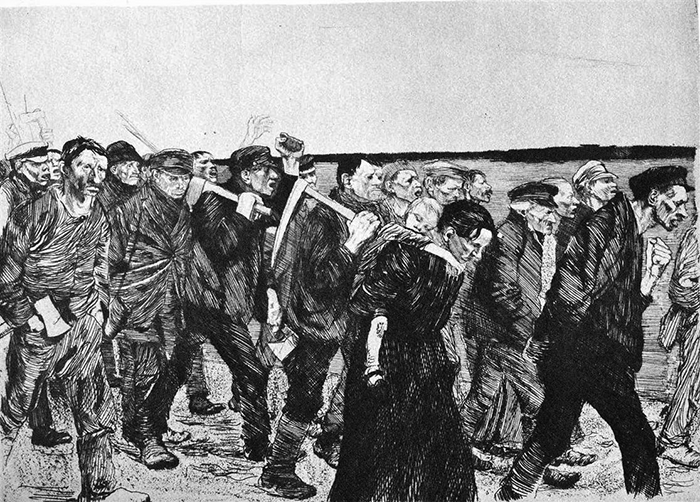
Kollwitz produced this engraving after watching a play about a famous strike by German weavers in the 1840s
The condition of the workers and their families as portrayed by Kollwitz is best explained in the context of which of the following?
Industrial boom and bust cycles and the lack of an effective social safety net
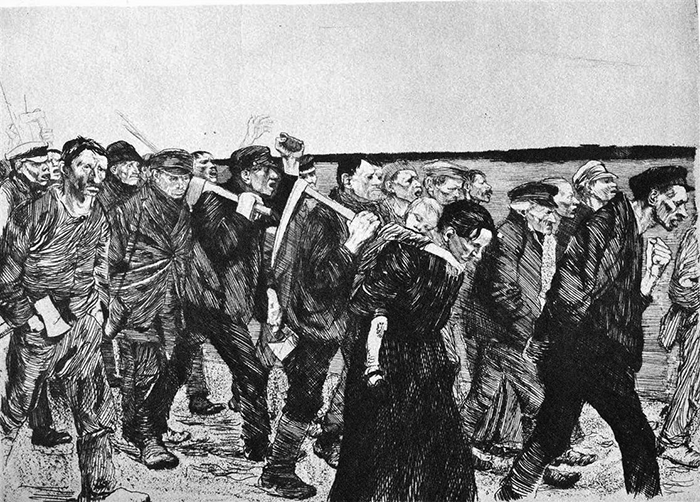
Kollwitz produced this engraving after watching a play about a famous strike by German weavers in the 1840s
Kollwitz’ depiction of workers and their families is best explained as a rejection of
the Romantic emphasis on heightened emotion and individualism
“Serbia will someday set Europe by the ears and bring about a universal war on the Continent. I cannot tell you how exasperated people are getting here at the continual worry which that little country causes to Austria under encouragement from Russia. It will be lucky if Europe succeeds in avoiding war as a result of the present crisis.”
Sir Fairfax Cartwright, British ambassador to Austria-Hungary, memo to the British Foreign Office, 1913
The instability that Cartwright attributes to Serbia’s actions is best explained by which of the following?
Nationalist agitation that threatened multiethnic empires
“Serbia will someday set Europe by the ears and bring about a universal war on the Continent. I cannot tell you how exasperated people are getting here at the continual worry which that little country causes to Austria under encouragement from Russia. It will be lucky if Europe succeeds in avoiding war as a result of the present crisis.”
Sir Fairfax Cartwright, British ambassador to Austria-Hungary, memo to the British Foreign Office, 1913
The willingness of Russia to support Serbia, as mentioned by Cartwright, is best explained by which of the following?
Development of an increasingly rigid system of alliances involving all major European powers
“Serbia will someday set Europe by the ears and bring about a universal war on the Continent. I cannot tell you how exasperated people are getting here at the continual worry which that little country causes to Austria under encouragement from Russia. It will be lucky if Europe succeeds in avoiding war as a result of the present crisis.”
Sir Fairfax Cartwright, British ambassador to Austria-Hungary, memo to the British Foreign Office, 1913
The tensions between Russia and Austria-Hungary alluded to by Cartwright were most strongly exacerbated by which of the following?
A major arms buildup